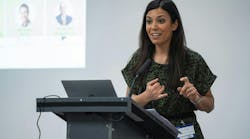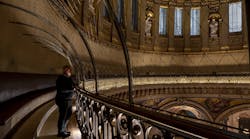Like many architecture students, Spurthy Yogananda had no idea lighting design was a field of study, much less a thriving profession. Though lighting designers comprise a smaller subset in the building sector than architects and interior designers, their role cannot be overstated. Lighting can make or break a work of architecture.
For Yogananda, the ability to shape the user experience, aesthetic impact, and energy efficiency of a project was appealing. Today, a decade after she left India to pursue a master’s degree in building science at the University of Southern California School of Architecture, Yogananda is a professional lighting designer at the Los Angeles office of HLB Lighting Design.
In this excerpt, Yogananda shares her experience as an emerging lighting designer and her advice for lighting mentors and mentees.
ArchSSL: What drew you to architectural lighting?
Yogananda: During my master’s program, I was a teaching assistant for [adjunct assistant professor] Lauren Dandridge. Until then, I had no idea what lighting design was. The way she spoke so passionately about it got me interested, and I realized how lighting is such a beautiful combination of sustainability and design.
I took her lighting design class as one of my [electives], and then I really fell in love with the field. Teachers can make a huge difference in your life.
What surprised you as you began to study lighting formally and then entered the profession?
Where I come from, lighting design is integrated with our architecture studio. It’s not a profession by itself. Seeing how much lighting can vary, and how much planning and involvement with codes is required to get to execution — that was mind-blowing.
One day, we are designing parks; the next, a hospital or a school. Each project is so different, and each has its own requirements and challenges, and I found that to be intriguing. As an emerging lighting designer, I understood that it’s not my job just to light the space, but to make sure the design is sustainable and does justice to the designer’s vision, especially at night.
What should emerging designers ask of their mentors?
A mentor who can help emerging designers navigate their early professional stages can be quite beneficial. It’s crucial to be clear about what you want to get out of the mentoring relationship when asking for advice from a mentor. Mentors can help with design and inspiration, but [they also can offer] a level of emotional intelligence that can be helpful as you go through other aspects of your career.
I ask my mentor, “How can I improve? What can I do better? What is the current trend? How can I keep up? What can I do from my end to help HLB — and myself — grow?” Our mentors [at the firm] make it easy for us to ask these questions. There are good and bad days, and particularly on my bad days, I find that speaking with my mentors can be refreshing and inspiring.
What can mentors expect of their mentees?
As a mentor, you want your mentees to be curious and open to learning. They should always look to grow their skill set and knowledge of design. Mentees should be proactive and able to adapt to different situations. Asking questions is a great way to learn and be proactive. No question is a dumb question, but having interest and taking the initiative to ask questions shows us that they are curious. That encourages us to teach more.
FULL VERSION: architecturalssl.com/33003698
"An emerging designer discovers the joys and challenges of architectural lighting" originally appeared on Architectural SSL, an Endeavor Business Media partner site.
WANDA LAU is editorial director of the Lighting Group, comprising LEDs Magazine, Architectural SSL, and LightSPEC West events. She previously served as executive editor of Architect magazine and worked for a decade in the architecture, engineering, and construction industry.
Follow our LinkedIn page for our latest news updates, contributed articles, and commentary, and our Facebook page for events announcements and more. You can also find us on Twitter.





